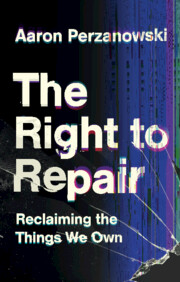Book contents
6 - Repair and Competition
Published online by Cambridge University Press: 30 December 2021
Summary
This chapter considers the role antitrust law can play in safeguarding repair markets and, along with them, the interests of competitors and consumers. While IP law may grants device makers power over their products, antitrust and competition law are designed to impose limits on exclusionary behavior. As a result, they serve as potential bulwarks against tactics that would impede repair. Despite significant doctrinal and policy hurdles to enforcement, antitrust law can help discipline firms that attempt to capture markets for the repair of vehicles, electronics, and appliances that account for hundreds of billions of dollars in annual revenue.
Keywords
- Type
- Chapter
- Information
- The Right to RepairReclaiming the Things We Own, pp. 167 - 198Publisher: Cambridge University PressPrint publication year: 2022

